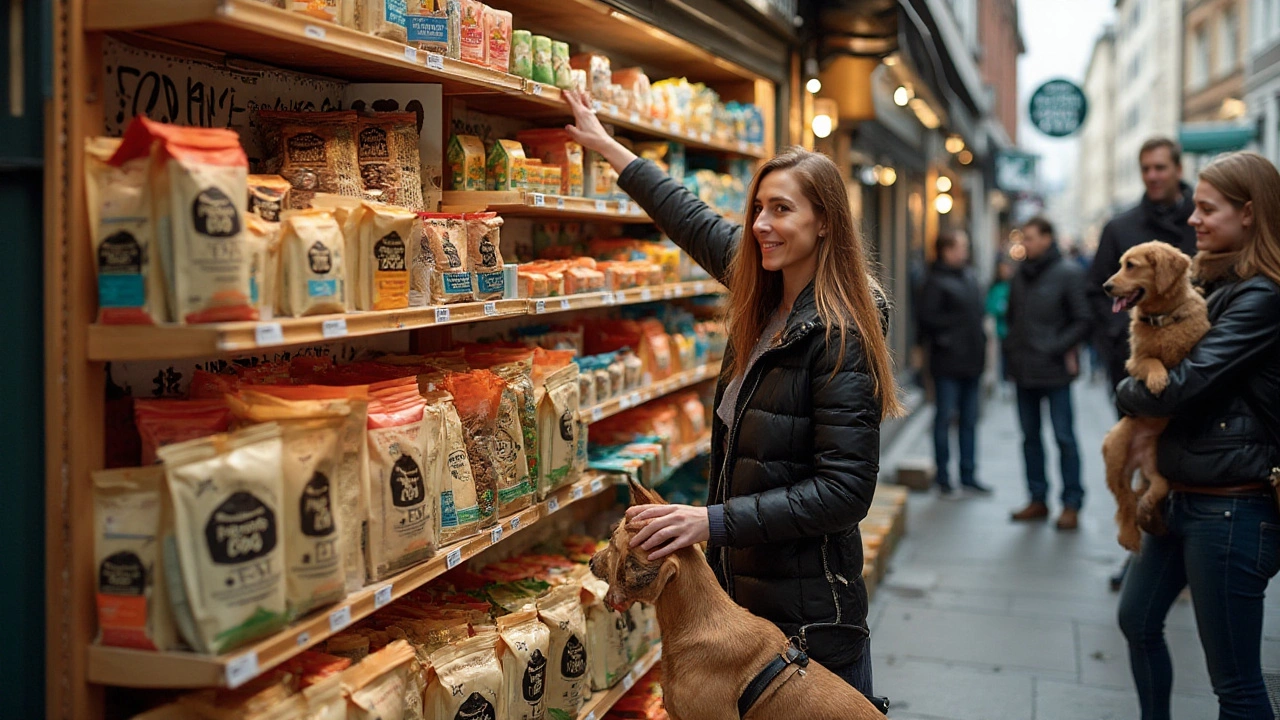In the realm of dog nutrition, finding a diet that aligns with both your preferences and your pet’s health needs can be challenging. One name that often emerges in discussions around canine diets is the Farmer’s Dog, a brand known for its commitment to fresh, personalized pet food.
This article examines whether veterinarians give their nod of approval to Farmer’s Dog meals, providing insights into its nutritional content, ingredient sources, and how it fares against conventional dog food. If you're pondering whether this fresh food fits into your dog's diet, you're in the right place to find out more.
- Understanding Farmer's Dog Offerings
- Veterinarians' View on Homemade Style Meals
- Nutritional Benefits of Farmer's Dog
- How to Make the Right Choice for Your Dog
Understanding Farmer's Dog Offerings
Farmer’s Dog has made a name for itself in the pet food industry by emphasizing freshness and personalization. This isn't your typical bag of kibble. They offer freshly-prepared, pre-portioned meals designed for dogs based on specific dietary needs. The idea is simple yet powerful: replicate the high-quality, balanced meals humans eat for their canine companions. The meals are crafted with real meat, fresh vegetables, and zero preservatives, making them akin to home-cooked meals specifically for our furry friends.
One of the standout features of the Farmer’s Dog is its meal delivery system. Owners start by filling out a quick profile about their pet's age, breed, weight, dietary restrictions, and activity levels. With this data, Farmer’s Dog tailors the meal portion sizes and nutritional mix to suit each dog's unique profile. This customization is one of their key selling points, allowing the company to cater to a variety of dog breeds and sizes, ensuring optimal health and nutrition. In contrast to traditional pet foods, which often rely on one-size-fits-all formulas, the Farmer’s Dog provides meals that are balanced and specific, which might explain why many pet owners rave about the improved health and energy levels they observe in their dogs.
The ingredients used are all recognizable — turkey, beef, sweet potatoes, and carrots, to name a few. They pride themselves on sourcing from reputable suppliers and ensuring these components are of high quality. This attention to detail not only supports the physical health of dogs but also appeals to eco-conscious consumers who care about the sourcing practices of the pet foods they purchase. By skipping artificial fillers and poorly understood additives, they present a more transparent approach in the dog food industry.
"What we feed our dogs is directly linked to their overall wellbeing," says Dr. Jessica Vogelsang, a renowned veterinarian and pet nutrition expert. "Companies like Farmer's Dog elevate the standard of pet food by focusing on quality ingredients and transparency."
The company's innovative approach also reflects in their packaging and delivery system. Meals are packaged in eco-friendly materials which keep them fresh through their journey from the kitchen to your door. The meals are scheduled to arrive just as you’re running low, eliminating any guesswork and ensuring the meals are served fresh. This convenience is not to be underestimated, especially in busy households where time is of the essence.
Customers can also choose from various meal plans, adjusting how frequently they receive new supplies. This flexibility caters to both those looking for daily feeding options and those supplementing other diet components throughout the week. Farmer's Dog adapts seamlessly to a variety of lifestyle needs, representing a shift towards more conscious pet ownership. These factors combine to make Farmer's Dog offerings not only novel but a practical choice for many modern pet owners seeking better nutrition outcomes for their dogs.

Veterinarians' View on Homemade Style Meals
Veterinarians frequently play a pivotal role when it comes to advising pet owners about diet and nutrition. Their insights are valuable, especially as pet parents navigate the crowded world of dog food options, from traditional kibble to the burgeoning market of fresh, homemade-style meals. Products like those offered by the Farmer's Dog appeal to pet owners seeking healthier, more personalized meals for their dogs. Vet endorsements can significantly sway decision-making, so understanding their perspective on such meals is crucial.
The concept of homemade style meals for dogs often garners attention because it aligns with a trend toward transparency and quality. Vets emphasize the importance of balanced nutrition; this is where many homemade meals sometimes fall short if they're not correctly formulated. However, brands like The Farmer's Dog employ veterinary nutritionists to ensure their recipes meet all necessary guidelines. This assurance goes a long way, as vets typically caution against homemade meals prepared without professional input due to risks of nutrient deficiencies.
According to Dr. Julie Mayer, a noted veterinarian, 'Ensuring complete and balanced nutrition is essential to maintaining a dog's health, and that's why I often recommend products like The Farmer's Dog.'This rounded approach appeals to both pet owners' desires for fresh meals and vets' insistence on nutritional adequacy.
Many veterinarians appreciate that fresh dog food companies often use higher-quality ingredients than conventional kibble or canned food. The Farmer's Dog promises ingredients sourced from reputable suppliers, resembling home-cooked meals without the need for owners to do the cooking themselves. This can be reassuring for vets and pet parents alike. Furthermore, veterinarians note that homemade style meals can be a great option for dogs with specific dietary sensitivities or those requiring tailored nutrition plans, as these fresh meals can often be customized more readily than traditional commercial dog food.
To ensure quality and safety, veterinarians recommend pet owners adhere to brands with stringent quality control processes. The Farmer's Dog is noted for cooking its meals at low temperatures to preserve nutrients, unlike traditional methods which might use high heat capable of diminishing the nutritional value. This method aligns with what veterinarians often advise for preparing food to retain essential vitamins and minerals. Such practices underscore a commitment to health that many vets can support.

Nutritional Benefits of Farmer's Dog
One of the standout features of Farmer's Dog meals is their emphasis on whole food ingredients. Unlike many traditional dog food options, which might rely heavily on fillers and artificial additives, Farmer's Dog prioritizes ingredients you might recognize from your own dinner plate. This includes fresh cuts of protein such as chicken, beef, and pork, paired with nutrient-rich vegetables like carrots and sweet potatoes. The philosophy here is simple: feed your dog the way you would feed yourself, avoiding unnecessary ingredients that could compromise health. This approach naturally aligns with what many veterinarians advocate for, pointing out that a diet closer to what dogs might eat in the wild can often lead to fewer health issues down the line.
Moreover, The Farmer's Dog ensures their recipes are crafted by veterinary nutritionists, making sure each meal is balanced and complete according to AAFCO standards. This attention to detail in formulating their meals reassures pet owners that their furry companions are receiving all necessary nutrients without the risk of dietary gaps. Regular monitoring and testing of their products guarantee that quality consistently meets the high standards pet parents have come to expect. In a market saturated with options, this dedication to transparency and quality control is a notable strength.
Additionally, fresh dog food diets like those from Farmer's Dog have shown benefits in several ways compared to their kibble counterparts. Dogs often have improved digestion due to the high-quality and recognizable ingredients. It's not just about what goes into the food, but also how these ingredients interact in your dog's system. Many pet owners report shinier coats, more energy, and improved stools, which can be attributed to the fresher ingredients and lack of processing. This real-food approach is becoming increasingly popular as pet parents look for ways to extend their pets' longevity and quality of life.
"The Farmer's Dog offers pet owners an opportunity to provide meals that are fresh and bioavailable, aiding in better absorption of nutrients," states Dr. Karen Becker, a known advocate for real food pet diets. "Many dogs show remarkable health improvements within a few weeks of transitioning."
To comprehend these perceived benefits firsthand, observe the following data highlighting the nutrient density between fresh foods versus traditional kibble. The table below draws on several research studies examining nutrient availability:
| Diet Type | Protein (%) | Fat (%) | Carbs (%) |
|---|---|---|---|
| Fresh (e.g., Farmer's Dog) | 30 | 20 | 40 |
| Traditional Kibble | 25 | 15 | 60 |
As seen, fresh options typically have higher levels of protein and fat, which are crucial for maintaining energy and overall health, and reduced carbohydrate content, which aligns with diet preferences among many veterinarians. This focus on health extends beyond mere marketing, aligning with nutritionally-sound principles known to those familiar with canine dietary needs. With this holistic approach to canine nutrition, Farmer's Dog provides a valuable alternative for those striving to maintain their pet’s health and happiness.

How to Make the Right Choice for Your Dog
Choosing the right dog food for your pet isn't just about reading labels; it's a blend of understanding your furry friend’s unique needs, consulting with experts, and considering your lifestyle. The first step is to assess your dog’s specific requirements based on factors like age, breed, weight, and activity level. Younger dogs, especially puppies, have different nutritional needs than older dogs. Larger breeds often require diets that support joint health, while active dogs need more calories to fuel their energy. Taking time to observe your dog's daily habits and energy levels can offer insight into whether they need foods focused on weight management, protein-rich diets, or something else entirely.
The second key factor is understanding the distinction between the various types of dog foods available on the market. Farmer’s Dog, for instance, prides itself on offering fresh, tailored meals that arguably mirror homemade cooking quality. Compare this to traditional kibble, which often has preservatives to extend shelf life. It’s crucial to note the benefits of fresh food, often lauded for its real meat and vegetable content, which can ease digestion and improve coat health in many dogs. A quote from Dr. Karen Becker, a well-respected holistic veterinarian, encapsulates this well:
"Feeding pets balanced, minimally processed foods... is one of the best ways to improve overall health."This underscores why many vets suggest supplements with commercial foods if nutritional content is lacking.
Deciphering vet recommendations requires a balanced approach. While some veterinarians recommend Farmer's Dog for its high-quality ingredients and nutrient-dense recipes, it's always essential to cross-verify these choices with your vet, especially if your dog has pre-existing conditions. There’s a growing trend of veterinarians who are starting to acknowledge the benefits of fresh, minimally processed diets, yet they always highlight the need for these meals to be complete and balanced. This means ensuring that the dog food meets nutritional guidelines set by associations like the Association of American Feed Control Officials (AAFCO).
Lastly, practicality cannot be overlooked. Delivery services like Farmer’s Dog offer the convenience of pre-portioned meals delivered right to your door, which is a huge plus for busy pet owners. But does it fit your budget, and does it align with your dog’s flavor preferences? Dogs are notoriously picky, so while a certain diet might be nutritionally sound, your pet’s taste buds might disagree. Sample packs can solve this dilemma, allowing you to test different flavors without committing to a full subscription first. It’s also useful to maintain a food diary to note any changes in your dog’s behavior, appetite, or stool consistency when switching diets.
In conclusion, making the right dietary choice for your dog involves a dance between balancing nutritional needs and lifestyle practicality. Whether it's choosing a fresh diet like Farmer's Dog or another type of food, the best decision is an informed one, catered to your pet’s particular health requirements and your own everyday needs. By consulting with your veterinarian and taking a proactive approach, you can ensure a diet that supports robust health and longevity for your beloved companion.








